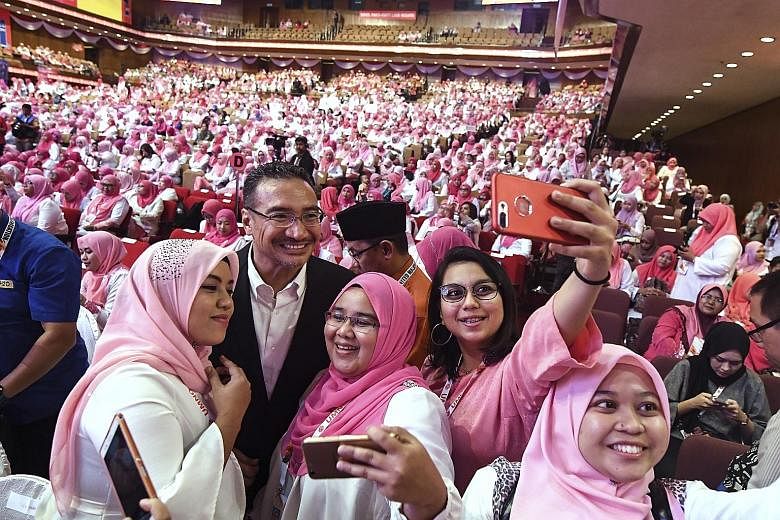As Umno holds its annual assembly, the party boasts an internal cohesiveness not seen in decades with Prime Minister Najib Razak as its undisputed leader.
But never before has Umno - which has led the government since independence in 1957 - been more unsure of its popular support, particularly among the country's politically dominant Malay community.
"Everything is stable in Umno and the opposition (alliance) is shaky. So naturally complacency has set in, and that is not good because the popular support has been falling from election to election," said Malaysian Deputy Home Minister Nur Jazlan Mohamed, a senior Umno politician from Johor.
Renewing the party's appeal to a sorely fractured Malaysian electorate is the top priority for Datuk Seri Najib and his key lieutenants at this week's gathering.
Umno's troubles with the Malay ground are not new. The steady erosion of support for Umno among the Malays set in shortly after former premier and then party president Mahathir Mohamad sacked his No. 2, Anwar Ibrahim, over policy differences in 1998.
The party's prestige slumped to a new low in the 2013 election when the Umno-led Barisan Nasional (BN) lost the popular vote for the first time in the country's history to the opposition, largely due to more slippage in Malay support. BN only retained power because of Malaysia's gerrymandered electoral system.

The political landscape is more challenging this time around.
There is a multi-cornered tussle for the Malay vote, with Umno facing competition from the country's other Malay-based parties, led by Parti Keadilan Rakyat, founded by jailed opposition leader Anwar, and including the main Muslim opposition party, Parti Islam SeMalaysia (PAS), and newly minted Parti Pribumi Bersatu Malaysia, led by former premier Mahathir.
Strong headline numbers on the economy, which the government and private economists are projecting to expand by as much as 5.7 per cent this year, have done little to blunt the negative sentiment because sharp spikes in the cost of living are weighing heavily on household incomes, particularly in Malay rural communities.
All of this is making the outcome of the next national election difficult to call.
Professor Shamsul Amri Baharuddin, who is the director of the Institute of Ethnic Studies at Universiti Kebangsaan Malaysia, acknowledged that the odds might appear to be stacked against Umno.
"But Umno is effective when the party's back is against the wall. What is being ignored is the hectic schedule the top leadership has been keeping in the rural areas, which is very effective," he said.
Some observers expect the opposition to retain control of Penang and Selangor, but political analysts like Prof Shamsul believe that Umno could score some gains in Kelantan and even pull off a surprise victory to wrest control of the backward state from PAS that has been in power there since 1990, largely because of the Islamic party's failure to deliver on the economic front.
But the electoral battles in other key Umno-controlled states, such as northern Kedah, Negeri Sembilan and Sabah, could toss up results against the ruling coalition.
Still, the predicted losses are not expected to be deep enough to eject Umno from power.
Malaysia's once-united opposition alliance is facing deep strains due to disagreements among its partners over strategies in taking on the ruling BN. Political analysts expect these disputes to worsen when parties must hammer out seat allocation in the upcoming electoral contests to avoid vote splitting.
Should Umno fail to arrest the erosion in Malay support in the peninsula in the upcoming polls, it could be forced to lean heavily on its alliance partners, particularly in the east Malaysian states of Sabah and Sarawak, and submit to major economic concessions from the two resource-rich territories.
The open question is whether this will trigger leadership troubles. For now, it seems unlikely.
"I still can't see a challenger to Najib in Umno at this point," noted Prof Shamsul.


